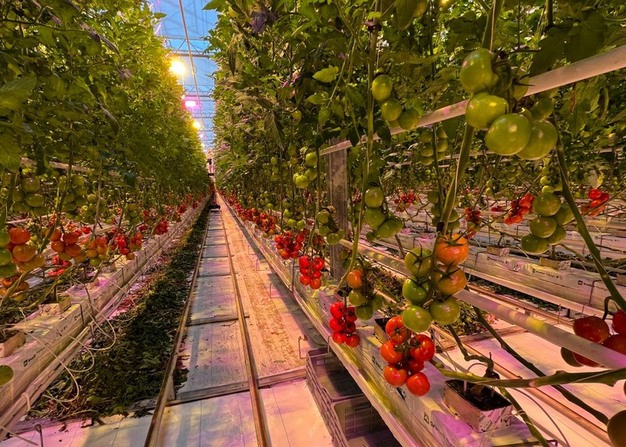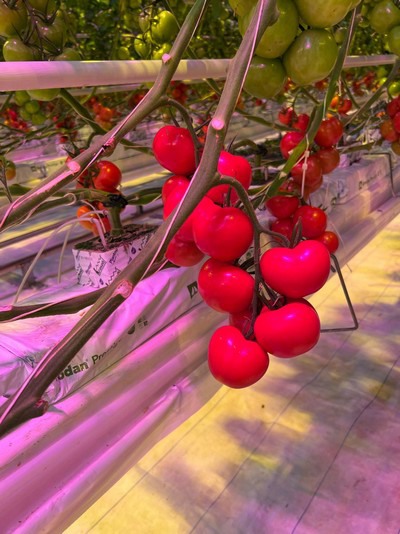The first tomatoes are starting to gain color in the greenhouses of Polish grower Citronex, yet it’s not the usual pink shade. This year, the company has decided to also grow traditional TOVs. “Because of the current situation in the EU, we decided to explore the market in Western Europe,” says Grzegorz Karolczak, commercial director.
In total, Citronex/PPO Siechnice operates 77 hectares of tomato greenhouses. Twenty hectares are now filled with Provine tomatoes. “Until now, we mainly focused on the Polish market and grew pink tomatoes. Considering the electricity costs and the situation of the Dutch market in winter times, we’re looking into possibly exporting more to Western Europe. That’s why we decided to grow the tomatoes popular in those markets: TOVs.”
The pink raspberry tomatoes grown in Citronex’s greenhouses are a premium product in the Polish market. “With all that has been and is happening, we wanted to spread our chances,” Grzegorz explains.

Energy crisis
Energy prices in Poland have roughly established around 1000 zlotys, which is more or less 225 euros per megawatt – twice as expensive as last year. “Our greenhouses are connected to power plants. We organize our infrastructure and try to work efficiently, without any middlemen, which allows us to keep the costs as low as possible. Despite of that, these costs also went up compared to last year – though not as high as electricity costs.
The complete 77-hectare acreage is equipped with lights for year-round production. To fight the high energy prices, the company replaced their HPS lamps with LEDs. “We need to look at our costs even more closely than last year - there’s just no margin for mistakes anymore. Looking at energy consumption, you see budgets are changing every second, and the price is horrific. We keep a close eye on which lamps to use, and we switch them off based on price fluctuations and the cultivation’s needs. For example, we use our HPS lamps at the border of the greenhouse, so the first rows in the greenhouse receive more heat from them, or we use the HPS fixtures to control the climate and vapor the humidity in the greenhouse. It makes sense to combine HPS with LED, but you need to do the math every time to switch them on.”
Energy prices and minimum wage The energy prices are not the only thing forcing them to look closely at their expenses. The minimum wage in Poland has gone up and will rise further once 2023 hits. “We mainly have Ukrainian workers in our tomato greenhouses. The rise of the minimum wage is very good, although it also builds additional costs for growers. With efficiency bonuses, we ensure all workers are rewarded by the fruits of their work as well.”
The energy prices are not the only thing forcing them to look closely at their expenses. The minimum wage in Poland has gone up and will rise further once 2023 hits. “We mainly have Ukrainian workers in our tomato greenhouses. The rise of the minimum wage is very good, although it also builds additional costs for growers. With efficiency bonuses, we ensure all workers are rewarded by the fruits of their work as well.”
Then there are also additional costs for keeping the greenhouses virus-free. ToBRFV is a challenge for growers all around Europe but also globally. With strict precautions, Citronex tries to keep their greenhouses rugose-free, as the company has seen how devastating the virus can be. “We do our laundry, disinfect crates, and do not allow people to meet between the greenhouses. Guests can only visit if they haven’t been in other greenhouses recently.”
All that together builds up the costs of growing tomatoes, which is why Citronex decided to start looking abroad. Their TOVs help them do so. Currently, the majority of the TOVs go to German retailers, but also Dutch retailers showed interest. “We harvest about 15 trucks weekly, and the majority of these tomatoes are sold in German retailers such as Lidl and Rewe.”
In the future, Grzegorz also sees opportunities to export pink tomatoes – although over the last couple of years, building a brand has proven to be difficult with this product, and there’s also a somewhat lack of interest from retailers from Western Europe to put a new tomato on the shelves. “We know we can grow a premium product, with great taste, and constant quality and build a premium brand around it, including packaging and promotion materials to distinguish it to the consumer. Working with a retail partner would be the next step.”
For more information:
Citronex
ul. Bohaterów II Armii Wojska Polskiego 64
59-900 Zgorzelec
+48 75 77 21 940
+48 75 77 21 946
[email protected]
www.citronex.pl
